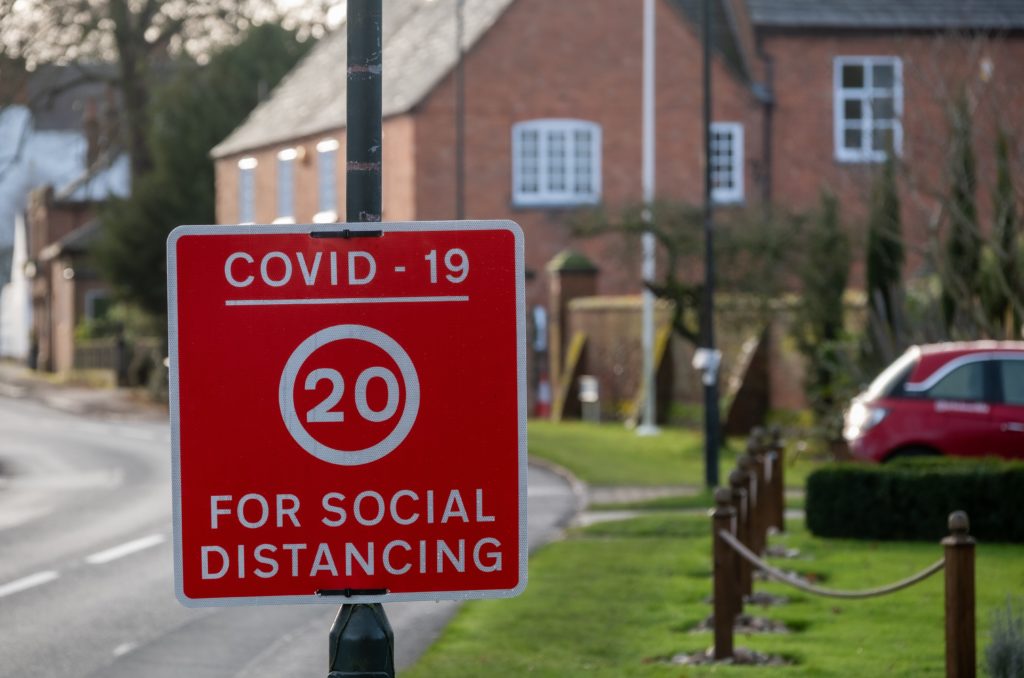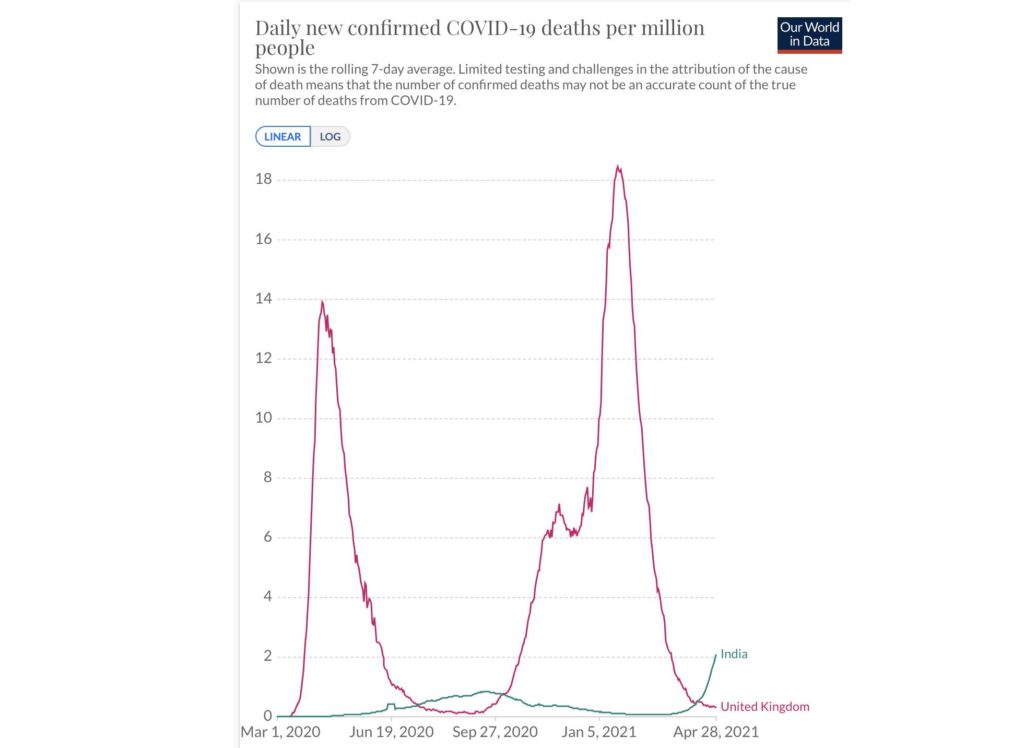Included in this week’s bulletin:
Too many rules – restrictions are opaque at best and satirically absurd at worst
Hundreds of thousands gather for protest – huge crowds march through London
Covid crisis in India – the distressing reports must be seen in context
No end in sight – Covid Marshall jobs to continue into 2022 and beyond
Legal updates – progress on a number of ongoing challenges
Open letter from scientists – leading academics call for an end to restrictions
The BPS defends Susan Michie – political ideology continues to stifle scientific debate

Too many rules
Restrictions are opaque at best and satirically absurd at worst
Decades of evidence on viral seasonality, acquired immunity, prior immunity are being ignored, with those in charge claiming that the virus will wreak havoc if we go about our normal lives. Many people agree that, on some level, the rules don’t make any sense. And yet still they remain.
A trip to the park for a care home resident results in 14 days of isolation while quarantining. Wedding receptions can only be celebrated outside with up to 15 people. Meanwhile, 30 people can attend an indoor funeral. What possible logical or scientific underpinning do such mandates have? Texans have been going happily about their lives for many weeks, with no deleterious effects, yet here in the UK there shall be no music or dancing at a wedding.
Holidays are not allowed, but you can travel for a ‘reasonable excuse’ which includes preparing a second home to rent. A handy loophole for people wealthy enough to own a second property abroad. No evidence for variants crossing borders or one variant being more vicious and deadly than any other has ever been presented. The idea was simply repeated in the media and then assumed to be ‘the science’. This does not make it so.
When scrutinising the extensive guidelines, while also noting the stark lack of a coronavirus ‘crisis’ in the UK for some months, one starts to feel uneasy about abuse of power. Are rights really going to be graciously returned, unless public pressure grows? How long will the government continue to ‘get away with it’, as Professor Neil Ferguson first suggested in March 2020?
Hundreds of thousands gather for protest
Huge crowds march through London
You won’t have seen much coverage of it on the mainstream news, but huge crowds marched through central London on Saturday 24 April to protest COVID-19 restrictions. It was possibly the biggest protest since the Iraq War march in 2003, when police estimated attendance to be well in excess of 750,000 people. You can judge the numbers for yourself from these aerial shots and this time lapse. Meanwhile, this BBC editor said there were 5k – 10k at most.
Detractors were quick to condemn the event on Twitter even though there is little evidence of transmission occurring outside – as confirmed recently on Radio 4 by SAGE advisor Professor John Edmonds. You can listen to his interview here; from 13:50. And why should outdoor gatherings be a problem? As the Chief Medical Officer and Chief Scientific Officer explained to the Science & Technology Committee back on 9 March: “It is the case that it is difficult to see how things like large beach gatherings and so on can cause a spike. The same was the case in a protest march in New York; they did not really see any spikes after that”. It is now the end of April.
No end in sight
Covid Marshall jobs to continue into 2022 and beyond
Despite the fact that there is currently no pandemic in this country, authorities do not seem to be acting as if they are going to deliver the promised return to normality on 21 June. As an example, multiple councils across the UK are advertising for Covid Marshall jobs… that start in July. They include Hertfordshire County Council who are advertising a £3 million deal to supply marshalls until 31 January with the possibility of extending the contract until 2023. SAGE certainly seems determined to keep restrictions going, as noted in the minutes of their most recent meeting: “As settings reopen, prevention measures will be important, e.g.… use of face coverings, physical distancing, adherence to quarantine, and encouraging vaccination.”
Covid crisis in India
The distressing reports must be seen in context
The reports from India are very distressing, especially if you have family or friends living there. But should the situation there be impacting on pandemic management in the UK? The answer surely must be no and yet somehow India’s ‘double mutant’, as previously the Brazil ‘variant’ or a third wave from Europe ‘washing up on our shores’, feature highly on the continued government and media message of fear. As we outlined in our briefing last week, variants are not extraordinary, nor are they necessarily cause for alarm.

The death rate in India has been rising very rapidly in recent weeks but this must be seen in the context of population size. There would normally be 27,000 deaths per day from all causes. As the above graph shows, the UK has had much higher daily deaths per million than has been seen so far in India. Commentators have been surprised that India has done so well to date and this may have provided some false reassurance, but sadly India is now seeing the typical rapid rise in cases seen this time last year in Europe when we were experiencing the first wave. For any country this presents a huge challenge to health services but for low and middle income countries this is even harder.
The data shows the situation varies widely between different areas of the country and it is hopeful that Delhi, where cases have been rising rapidly, may just be beginning to turn the corner such that deaths should start to reduce a couple of weeks later. It is perhaps unfortunate that the WHO had recently advised against Ivermectin, which previously had been deployed very successfully in Uttar Pradesh and several other states. Its use in the community has now been approved by the All India Institute of Medical Sciences since 22 April. HART was very pleased to see that ventilators and in particular oxygen concentrators have been flown out to India from the UK today.
Legal update
Progress on a number of ongoing challenges
Two weeks ago we reported on a number of legal challenges. Here is the latest:
- A hearing in this test case on masks in school (at which the claimant seeks an injunction to prevent continuing harm pending a full hearing) is being heard this Friday (30 April).
- News is expected imminently on the UK hospitality industry’s challenge to its unfair treatment compared to retail.
- There is extremely disturbing news in relation to the Weimar Family Court decision prohibiting two schools from requiring pupils to wear face coverings of any kind, from imposing social distancing and from testing pupils. It has been reported that the judge in that case has had his house, office, and car searched by police, and his cell phone confiscated. Democracies rely on an independent judiciary as an essential check on the exercise of excessive or inappropriate powers by government and this development, together with the powerful censorship of alternative viewpoints currently being experienced in many nations, is immensely concerning.
- The renowned defense attorney retained by the judge has described the police’s actions as unfounded. A Leipzig-based lawyer has claimed that judicial independence in Germany has been “cleared away without the blink of an eye”, and called for “a wave of protest from all bar associations, Judges’ associations and professional colleagues”.
Open letter from scientists
Leading academics call for an end to restrictions
Twenty-two leading academic scientists and doctors have written an open letter to the Government, accusing Ministers and advisers of exaggerating the threat from COVID-19. Signatories include Professor Carl Heneghan from University of Oxford and Professor Robert Dingwall, a member of NERVTAG – the government advisory group.
“We are being told, simultaneously, that we have successful vaccines and that major restrictions on everyday life must continue indefinitely. Both propositions cannot be true.” They called for an end to all restrictions in June. In particular they mentioned ending social distancing and mask wearing in schools and in the community. There is no current strategy for when these will end. They called for mass testing and vaccine passports to stop. Finally, they emphasised the need to prepare the NHS for the coming winter, when respiratory viruses have a seasonal peak as well as COVID-19.
The BPS defends Susan Michie
Political ideology continues to stifle scientific debate
The British Psychological Society (BPS) – the lead organisation for psychological specialists in the UK – has issued a statement in defence of Professor Susan Michie, an influential behavioural scientist and SAGE member, following recent disclosures about her in the news media. The Daily Mail story had referred to her wealth and her longstanding membership of the British Communist Party. Within 48 hours of the offending article, the BPS broadcast their ‘unanimous support’ for Michie and denounced the criticisms on the grounds that they did not ‘engage with the science’ but were an example of ‘shooting the messenger’. While HART believes it is laudable for a professional organisation to promptly defend one of its members from ad hominem attacks, the BPS statement conveys double standards and encapsulates much that is wrong with the mainstream response to the COVID-19 crisis.
On 6 January, 2021, 46 psychologists and therapists sent a letter to the BPS raising serious ethical concerns about the Michie-inspired covert psychological ‘nudges’ (including the use of fear inflation and shaming) underpinning the Government’s coronavirus communication strategy. The letter asserted that it was morally questionable to deliberately inflict emotional distress on people as a means of gaining their compliance, and that this tactic may have significantly contributed to excess non-COVID deaths. The BPS has yet to address these ethical questions, and will not consider them until June at the earliest: two days to respond to a personal attack on a leading BPS figure, 112 days (and counting) to respond to the charge of pervasive psychological and physical harms to British citizens.
Also, the BPS statement repeatedly references ‘the science’ as if it is synonymous with the unprecedented public health restrictions, illustrating how this term has been habitually abused throughout the pandemic. While Michie’s behavioural strategies of influence are evidence based, lockdowns and mandatory masks for the healthy are not. Furthermore, any expert expressing alternative views that challenge these authoritarian, China-inspired restrictions often endure personal attacks on their characters and false accusations that they are prioritising libertarian values over saving lives, or – as per the BPS statement – giving ‘greater weight to individual freedoms and economic activity than public health protection’. Like many professional bodies across the health and education sectors, the BPS is guilty of allowing their dominant political ideology to stifle scientific debate. After all, we all want the same thing: an open exchange of ideas to shape a public health response that achieves total harm minimisation.
